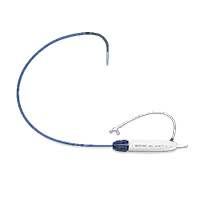Arctic™ Front Family of Cardiac Cryoablation Catheters

The Arctic™ Front Advance and Arctic Front Advance Pro™ Cardiac Cryoablation Catheters are approved to treat drug refractory, recurrent, symptomatic, paroxysmal and persistent atrial fibrillation (episode duration less than 6 months). The Arctic™ Front Advance and Arctic Front Advance Pro™ Cardiac Cryoablation Catheters are also approved to treat recurrent, symptomatic, paroxysmal atrial fibrillation as an alternative to anti-arrhythmic drug therapy as an initial rhythm control strategy.
The catheters have a proven safety and efficacy profile in treating AF.2
Indications, Safety, and Warnings
Product DetailsAchieve™ and Achieve Advance™ Mapping Catheters

The Achieve™ and Achieve Advance™ Mapping Catheters are intra-cardiac electrophysiology diagnostic catheters designed for use with the Arctic Front family of cardiac cryoablation catheters and the FlexCath Contour™ Steerable Sheath.
Indications, Safety, and Warnings
Product DetailsFreezor™ Family of Cardiac Cryoablation Catheters

The Freezor™ family of cardiac cryoablation catheters are flexible, single-use, minimally invasive devices designed to ablate cardiac tissue. They are the only focal catheters that utilize the cryo energy source, with ablation indications ranging from atrioventricular nodal reentry tachycardia (AVNRT) to atrial arrhythmias.
Indications, Safety, and Warnings
Product DetailsDiamondTemp™ Ablation System

As the only open-irrigated RF catheter with industrial diamonds to optimize power based on tissue surface temperature, the DiamondTemp™ ablation system (DTA) with RealTemp™ is safe and effective, and has demonstrated procedural efficiencies compared to contact force-sensing RF.1
Indications, Safety, and Warnings
Product DetailsFlexCath Contour™ steerable sheath family

FlexCath Contour™ steerable sheaths enable electrophysiologists to steer therapy with confidence. Enhanced maneuverability, refined transitions, and the zero exchange workflow are experienced throughout each ablation procedure.
Indications, Safety, and Warnings
Product DetailsPulseSelect™ pulsed field ablation system

The PulseSelect™ pulsed field ablation (PFA) system is a cardiac ablation system that enables both mapping and precise lesion delivery using biphasic waveform optimization.
Indications, Safety, and Warnings
Product DetailsFlexCath Cross™ transseptal solution

The FlexCath Cross™ system is an integrated transseptal solution with a zero exchange workflow and pairs with commercially available sheaths for both mechanical and radiofrequency (RF) crossing.
Indications, Safety, and Warnings
Product DetailsNitron CryoConsole™ cardiac cryoablation system

The Nitron CryoConsole system houses the electrical and mechanical components as well as proprietary software for cryomapping, controlling, and recording a cryotherapy procedure performed with the Arctic Front or Freezor™ family of cryoablation catheters. Multiple features are built into the Medtronic cryoablation catheters and the Nitron CryoConsole system to promote system safety and efficiency.
Indications, Safety, and Warnings
Product DetailsAffera™
Experience a new paradigm in electrophysiology
Affera™ Mapping and Ablation System All-in-one - map, ablate, validate

References
Kautzner J, Albenque JP, Natale A, et al. A Novel Temperature-Controlled Radiofrequency Catheter Ablation System Used to Treat Patients With Paroxysmal Atrial Fibrillation. JACC Clin Electrophysiol. March 2021;7(3):352–363.
Packer DL, Kowal RC, Wheelan KR, et al. Cryoballoon ablation of pulmonary veins for paroxysmal atrial fibrillation: first results of the North American Arctic Front (STOP AF) pivotal trial. J Am Coll Cardiol. April 23, 2013;61(16):1713–1723.

